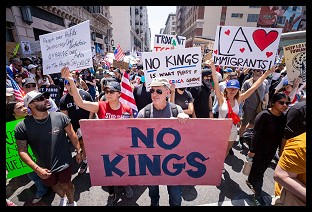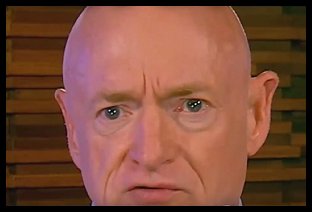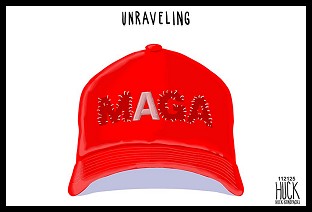 Today on The BradCast: How "news deserts" are quickly expanding across the U.S. and how they played a disturbing role in this year's Presidential election. [Audio link to full show follows this summary.]
Today on The BradCast: How "news deserts" are quickly expanding across the U.S. and how they played a disturbing role in this year's Presidential election. [Audio link to full show follows this summary.]
While finger-pointing continues in the wake of the stunning, if very narrow (less than 1.5%) popular vote victory of Donald Trump over Kamala Harris last month, we continue to focus on the many failures of the media that led to it, including corporate media, social media and independent media. And, in some cases, as discussed on today's show, a lack of local media in news deserts around the country.
According to the 2024 State of Local News report from Northwestern University's Medill School of Journalism, "Since 2005, more than 3,200 print newspapers have vanished." They are now said to be disappearing at "a rate of more than two per week", with some daily papers becoming weeklies, and many ending their print editions entirely. "As news organizations continue to contract, news deserts --- areas that lack consistent local reporting that fills critical information needs --- continue to expand."
Our guest today, 36-year former Washington Post media reporter PAUL FARHI, in an analysis of the Medill study with John Volk, finds that while Trump won the 2024 election "with one of the smallest popular vote margins in U.S. history", in 91% of news deserts he won by "an avalanche," by an average of 54 points in the 193 counties identified as news deserts where county-level results were available as of last week.
But, as Farhi and Volk note in their coverage, quoting Steven Waldman of the Rebuild Local News organization, "The wrong way to interpret this is ‘Oh, the rubes voted for Trump because they’re uninformed.’”
What is the right way? Well, that's what Farhi is here to discuss today.
He explains that those voters who live in news deserts --- usually rural, though not always Republican-leaning counties --- do have access to national media outlets such as CNN, Fox "News", the New York Times, etc. But, without local news outlets to add context to national issues, they may end up voting against their own best interests. Those voters, for example, may not realize that the Trump/Republican call for tariffs might end up raising local prices or result in the loss of local employment. They may not understand that access to healthcare and the right to abortion may be lost in their own community.
"These issues have local resonance," Farhi tells me, "but they don't if you have no access to understanding how they affect your local community. So what happens? The research that's emerging is that people frame their choice around their partisanship. 'I'm a Republican, I'm going to vote Republican. I don't need any local news to modify that behavior because I don't have any news to modify that behavior.' It increases the polarization and the partisanship of the electorate, because they have no information to weigh it against what's happening in their local community."
Beyond politics, Farhi notes: "In news deserts, because you don't have a watchdog, you have more political corruption on average. You have higher taxes on average. You have lower bond ratings. You have a certain kind of social alienation and loss of community, because no one is covering the high school sports, or obits, or the community events, or the things that are not major stories, but they kind of give a community some cohesion and coherence, and common knowledge. Those things, when they disappear, which they do in news deserts, are disproportionately affecting Trump voters."
The disturbingly fast expansion of news deserts may also be leading to a growth in ticket-splitting --- votes cast for a Republican at the top of the ticket, for instance, but no votes at all cast for Senator, Congress or in local races. That's because voters may simply not have enough local information to know how to vote. Ironically, that may have helped Democrats win some of those Senate and House races this year in states where Harris lost the popular vote to Trump.
It's a fascinating conversation. And a disturbing one. Also, given Farhi's 36 years as a media reporter at Washington Post until leaving last year, I asked him for his thoughts on the decision by the paper's billionaire owner, Amazon founder Jeff Bezos, to nix the planned Editorial Page endorsement of Harris just days before the November election; how Bezos' ownership has affected the venerable news outlet; and whether he thinks it is a good or bad idea, for news in general, for people to cancel subscriptions to such outlets in protest. (More than 250,000 subscribers reportedly did exactly that just after Bezos spiked the paper's endorsement of Harris.) Please tune in for all of that and much more in our discussion today!
ALSO TODAY...
- The Dept. of Justice Inspector General released a report on the abuse by the Trump Administration's leak investigations that included spying on two members of Congress (Democrats Adam Schiff and Eric Swalwell), along with 43 staff members of both Republican and Democratic lawmakers. One of the staffers secretly caught up in the 2017 probe, was Kash Patel, Trump's proposed nominee to head the FBI. He served as a staffer, at the time, to a Republican Congressman and only recently learned that the Administration abused DoJ policies to obtain his email and phone records. Suffice to say the report may add reasons for Patel to be angry and seek retribution, but not of the media or Obama or Biden Administrations, despite his vow to investigate and jail both members of the media and officials of both Administrations. His problems, it seems, may be much closer to home.
- Finally, as yet another apocalyptic climate change-fueled wildfire threatens celebrity homes and Pepperdine University in Malibu today, Desi Doyen joins us for our latest Green News Report, with news on deadly back-to-back storms in the U.K. and Ireland; China's EV boom eroding the global demand for oil; and Donald Trump's plans to end Joe Biden's landmark loan programs to renewable energy companies and tax credits to consumers like you, for home improvements such as solar panels, weatherized windows and electric vehicles...
(Snail mail support to "Brad Friedman, 7095 Hollywood Blvd., #594 Los Angeles, CA 90028" always welcome too!)
|


 Dems Fight to Avoid the GOP's Massive, Year-End Health Care Cliff: 'BradCast' 12/4/25
Dems Fight to Avoid the GOP's Massive, Year-End Health Care Cliff: 'BradCast' 12/4/25 'Green News Report' 12/4/25
'Green News Report' 12/4/25
 A 'Flashing Red Light
A 'Flashing Red Light 'Fog of War'?: Hegseth, War Crimes and the DoD's 'Politicization Death Spiral': 'BradCast' 12/2/25
'Fog of War'?: Hegseth, War Crimes and the DoD's 'Politicization Death Spiral': 'BradCast' 12/2/25 'Green News Report' 12/2/25
'Green News Report' 12/2/25 Follow the
Follow the  Sunday 'Bootlicker' Toons
Sunday 'Bootlicker' Toons With Thanks, No Kings and Good Cheer
With Thanks, No Kings and Good Cheer Presidential Illegality and the Duty to Disobey
Presidential Illegality and the Duty to Disobey Sunday 'Leave 'em in Stitches' Toons
Sunday 'Leave 'em in Stitches' Toons President of United States Calls for Killing Democratic Officials: 'BradCast' 11/20/25
President of United States Calls for Killing Democratic Officials: 'BradCast' 11/20/25 'Green News Report' 11/20/25
'Green News Report' 11/20/25 Is MAGA Finally Beginning to Fall Apart?: 'BradCast' 11/19/25
Is MAGA Finally Beginning to Fall Apart?: 'BradCast' 11/19/25 Trump's Terrible, Horrible, No Good, Very Bad Day (Week? Month? Year? Life?): 'BradCast' 11/18/25
Trump's Terrible, Horrible, No Good, Very Bad Day (Week? Month? Year? Life?): 'BradCast' 11/18/25 'Green News Report' 11/18/25
'Green News Report' 11/18/25 A Kaleidoscope of Trump Corruption: 'BradCast' 11/17/25
A Kaleidoscope of Trump Corruption: 'BradCast' 11/17/25 Sunday 'Back to Business' Toons
Sunday 'Back to Business' Toons Trump DOJ Takes Stand for Voting Whites in CA: 'BradCast' 11/13/25
Trump DOJ Takes Stand for Voting Whites in CA: 'BradCast' 11/13/25 'Green News Report' 11/13/25
'Green News Report' 11/13/25 Mamdani's 'Surprisingly Affordable' Afford-ability Agenda for NYC: 'BradCast' 11/12
Mamdani's 'Surprisingly Affordable' Afford-ability Agenda for NYC: 'BradCast' 11/12 After the Shutdown and Before the Next One: 'BradCast' 11/11/25
After the Shutdown and Before the Next One: 'BradCast' 11/11/25 2025 Election Victories; Also: 7 Dems, 1 Indie End Shutdown: 'BradCast' 11/10/25
2025 Election Victories; Also: 7 Dems, 1 Indie End Shutdown: 'BradCast' 11/10/25 'We Can See Light at the End of the Tunnel' After Election 2025: 'BradCast' 11/6/25
'We Can See Light at the End of the Tunnel' After Election 2025: 'BradCast' 11/6/25 BLUE WAVE! Dems Win Everything Everywhere All at Once: 'BradCast' 11/5/25
BLUE WAVE! Dems Win Everything Everywhere All at Once: 'BradCast' 11/5/25 Repub Thuggery As Americans Vote: 'BradCast' 11/4/25
Repub Thuggery As Americans Vote: 'BradCast' 11/4/25 Last Call(s) Before Election Day 2025: 'BradCast' 11/3/25
Last Call(s) Before Election Day 2025: 'BradCast' 11/3/25 A Pretty Weak 'Strongman': 'BradCast' 10/30/25
A Pretty Weak 'Strongman': 'BradCast' 10/30/25
 VA GOP VOTER REG FRAUDSTER OFF HOOK
VA GOP VOTER REG FRAUDSTER OFF HOOK Criminal GOP Voter Registration Fraud Probe Expanding in VA
Criminal GOP Voter Registration Fraud Probe Expanding in VA DOJ PROBE SOUGHT AFTER VA ARREST
DOJ PROBE SOUGHT AFTER VA ARREST Arrest in VA: GOP Voter Reg Scandal Widens
Arrest in VA: GOP Voter Reg Scandal Widens ALL TOGETHER: ROVE, SPROUL, KOCHS, RNC
ALL TOGETHER: ROVE, SPROUL, KOCHS, RNC LATimes: RNC's 'Fired' Sproul Working for Repubs in 'as Many as 30 States'
LATimes: RNC's 'Fired' Sproul Working for Repubs in 'as Many as 30 States' 'Fired' Sproul Group 'Cloned', Still Working for Republicans in At Least 10 States
'Fired' Sproul Group 'Cloned', Still Working for Republicans in At Least 10 States FINALLY: FOX ON GOP REG FRAUD SCANDAL
FINALLY: FOX ON GOP REG FRAUD SCANDAL COLORADO FOLLOWS FLORIDA WITH GOP CRIMINAL INVESTIGATION
COLORADO FOLLOWS FLORIDA WITH GOP CRIMINAL INVESTIGATION CRIMINAL PROBE LAUNCHED INTO GOP VOTER REGISTRATION FRAUD SCANDAL IN FL
CRIMINAL PROBE LAUNCHED INTO GOP VOTER REGISTRATION FRAUD SCANDAL IN FL Brad Breaks PA Photo ID & GOP Registration Fraud Scandal News on Hartmann TV
Brad Breaks PA Photo ID & GOP Registration Fraud Scandal News on Hartmann TV  CAUGHT ON TAPE: COORDINATED NATIONWIDE GOP VOTER REG SCAM
CAUGHT ON TAPE: COORDINATED NATIONWIDE GOP VOTER REG SCAM CRIMINAL ELECTION FRAUD COMPLAINT FILED AGAINST GOP 'FRAUD' FIRM
CRIMINAL ELECTION FRAUD COMPLAINT FILED AGAINST GOP 'FRAUD' FIRM RICK SCOTT GETS ROLLED IN GOP REGISTRATION FRAUD SCANDAL
RICK SCOTT GETS ROLLED IN GOP REGISTRATION FRAUD SCANDAL VIDEO: Brad Breaks GOP Reg Fraud Scandal on Hartmann TV
VIDEO: Brad Breaks GOP Reg Fraud Scandal on Hartmann TV RNC FIRES NATIONAL VOTER REGISTRATION FIRM FOR FRAUD
RNC FIRES NATIONAL VOTER REGISTRATION FIRM FOR FRAUD EXCLUSIVE: Intvw w/ FL Official Who First Discovered GOP Reg Fraud
EXCLUSIVE: Intvw w/ FL Official Who First Discovered GOP Reg Fraud GOP REGISTRATION FRAUD FOUND IN FL
GOP REGISTRATION FRAUD FOUND IN FL

































